Journal prompts, Journaling for beginners, Journaling tips & techniques
Healing Anger in relationships through Journaling
How do heal Anger in a relationship and bring back love and peace?
Are you struggling with Anger in your relationships and wish to have a loving bond devoid of Anger?
Anger is a natural response to anything that triggers us. However, we have wildly misunderstood Anger and this is what makes me feel more passionate to talk about this.
Have you been in a state where anger in the relationship is affecting your bond? Maybe you suddenly burst off out of nowhere on your partner or snap at your kids. If you feel guilty about being angry all the time, let me tell you – this is not abnormal. Anger in the relationship is normal because being a human you’re bound to experience heavy emotions.
However, this is not to justify that everything you do in your anger is correct or out of your control. Your emotions are in your control and if not, this post is for you to how to manage your anger.
Sometimes, anger makes us do or say things that we regret later, and living on this guilt trip is immensely heavy. Let me help you with how you can manage your anger issues in your relationships. Before learning the tips on managing your anger in relationships, let’s talk about the triggers.
( Do you know I have an intensive course on managing Anger using the power of journaling? If not, check out the details here)
Why do you get angry with your partner?
As coined earlier, anger is a natural response to something triggering us. We all have certain suppressed emotions within – this can be frustration, anxiety, sadness, hurt, pain, or grief which gets triggered and our natural response is ANGER.
I want you to sit with yourself today and ask this question. Why do you get angry with your partner? What are some of their actions or words that trigger anger within?
Besides, I want you to understand that no one can really make you feel anything. This includes love as well as anger.
Others can only trigger the feeling you have within – they don’t initiate or create that feeling inside of you. You have anger, love, and grief within that gets triggered by someone’s actions or words. This is why it’s so important to take responsibility for your reaction as well as healing instead of plainly blaming others.
Your anger response may be due to your partner’s words or their actions, but knowing that you’re in charge of your emotions gives you so much power to handle the situation mindfully.
It’s also necessary to understand that not all anger is bad. I truly believe that Anger can be constructive and can show us the signs of something bad happening.
Healthy anger can be a safety measure to warn you of a bad situation. It might even be a result of noticing things that aren’t fair in your relationship.
Anger issues in relationships might be because of something resentful you’ve been carrying for a while. Our suppressed and repressed emotions can result in our sudden outbursts.
Ask yourself; Is this anger because your partner is not able to understand you or you’re angry because of any past conversation with another family member? Let’s check some common anger triggers in relationships.
The Intensive Anger Journaling course comes with five detailed modules, five guided journals, five coaching sessions, and three mindful meditations. Check out the course details here.
Anger triggers in relationships:
Managing anger in the relationship is a sign that you care for your bond. Let’s say that your anger is a response to something that’s happening in your relationship. What is so upsetting to you? How can you “fix” it? Let’s look at some triggers you may be dealing with.
Several things can trigger anger in relationships. Maybe you’re upset at your partner because:
1. They did or said something hurtful
Words can open up or heal wounds. Your anger can be the response to your partner’s action or the hurtful words they said to you. If your partner says or does something that offends you despite of you letting them know your feelings; it can result in an angry outburst.
2. They are hardly available / no time to spend together
This is more frustration than anger when your partner is not able to spend more time with you. Maybe he or she is always working or coming late from work and you feel they’re not giving you the attention you deserve.
3. They don’t help you with household responsibilities
I hear this all the time from my clients. Do you find yourself doing all the work around the house while your partner is busy playing games on his phone?
This can definitely trigger your anger even when you’re a calm person.
4. They don’t prioritize you
It can be really annoying if your partner puts his career or anything else before you and your relationship. This can definitely trigger anger and frustration that you might have been storing for a long.
5. They hold grudges
It’s common to have a fight in the relationship but if your partner keeps on holding grudges, it will be impossible to bring in love and peace. If your partner holds grudges about things you’ve done or said in the past and you feel like you can never be forgiven, it might turn into anger.
This is why I teach ‘ How to practice forgiveness’ in my Anger Journaling course.
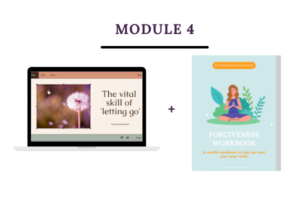
There can be various other reasons that can trigger this feeling of anger within and I would love for you to grab your journal and ask yourself – ‘ What is the reason behind my anger today’?
Here’s a detailed post on how you can use journaling to tame your temper.
Now that you know what makes you angry; it’s time to manage your anger and bring back the love + peace you always desired.
How do I control anger in relationships?
The most important part of learning how to control anger and frustration in a relationship is identifying your triggers and then coming up with strategic ways to react.
1. Pause and reflect
Anger is mostly a reaction and not our response. In order to have a mindful response to anger, it’s necessary to pause for a while and reflect on the situation instead of losing control. This can indeed be difficult but when you practice it consciously, this will be your natural response toward anger in relationships.
Something as taking a deep breath really does work. Try counting to 10 if you find it difficult to regain your composure.
2. Communicate your feelings
Keep calm and identify how you’re actually feeling in the given moment. In a calm way, explain to your partner how you’re feeling and it’s okay to be direct here.
Many times we assume that our partners know how we’re feeling after a fight or a disagreement. This is so not true. Be vocal about your feelings and let your partner know what their words or action really upset you. Start with ‘I statements..’
3. Be in the moment
I have experienced this a lot in my case. I tend to go to the past or future when I’m angry and just label the person as ‘He has always been this way’. Instead of giving your Ulitmate judgment about your partner, choose to stay in the moment without bringing up any past conversation or fight.
Managing anger in a relationship requires deep inner work and you being here is the evidence that you’re ready for the change.
4. Keep a log of your Anger
Working and healing your anger can totally change your life by transforming you into a calmer person. We all have anger within and the only way to realize our anger behavior and patterns is by tracking them.
Here’s a post on anger management where I’ve mentioned in detail about keeping a log of Anger.
5. Walk away
There are those times when yes, you’re going to be very angry. You might need more than just a minute. A deep breath may not do the trick. That’s OK.
Knowing when it’s time to walk away is just as important as understanding what your anger trigger is. Physically leaving the room or space you’re in if you need to may give you enough time to collect your thoughts and try to let go of your anger before you attempt to re-approach the situation.
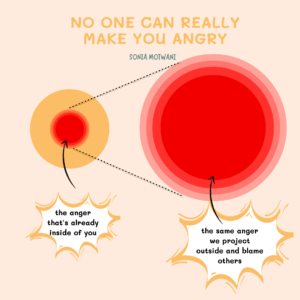
6. Picture your partner at their best
Anger blinds us and we forget everything when we are angry, especially the good aspects of our relationships. We forget the times when our partner was there for us during those tough hours and all the memories that we created together. I tend to get lost in my anger and I didn’t allow any such pleasant feeling to enter my system.
However, when I took some time-out, I realized that ‘Anger was just a phase’ and maybe it had some message for me. I journaled around anger and realized that my anger demanded some change, so we sat together and negotiated to bring the solution.
This is why I never believe that Anger is a negative or bad emotion. Anger carries a message but you need to be conscious and mindful enough to listen to it. My course on Anger Journaling elaborates on this at a much deeper level.
The fifth module of my Anger journaling specifically touches upon the Anger in Relationships and how to manage it without losing your head. The course also had five guided journals to help you heal your Anger.
Journaling to manage Anger in relationships:
Here’s a thing about journaling that makes me fall for this art – journaling makes you conscious and when you’re mindful aka conscious; you’re in a better position to make some wise decisions. And life is all about the choices we make, so choose wisely.
When I started journaling about my anger, I realized that my anger seemed from my childhood wounds. I was carrying unhealed, suppressed emotions from my childhood which I was depicting in my relationships. I had an abandonment wound.
I almost didn’t realize this until I dived deeper into inner-child healing and connecting the dots.
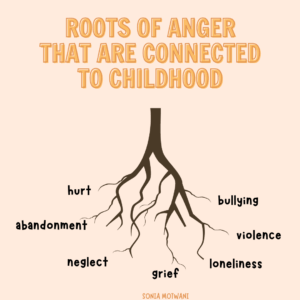
As a surprise, my client experienced the same thing. During our 1-1 session, she realise that she was carrying the childhood wound of ‘comparison’. Her parents always compared her with other kids growing up and she started doing the same with herself.
When I tell you this work is phenomenal, I really mean it.
Journal Prompts to heal Anger in Relationships:
Here’re some mindful journal prompts to help you heal the anger in your relationships:
- What are the best parts of your current relationships? What is going well?
- What as a child you always felt deprived of? Do you yearn for the same from your current relationship?
- Write in detail about the situation that sparked your anger. Dig deeper and see if you can pinpoint a specific emotion behind that anger.
- How were you responded as a child when you got angry?
- Are you suppressing any emotion or other feelings behind your anger that you might not be allowed to express as a kid?
- Have you ever wished to change another person or circumstances that might have resulted in anger? Why do you wish so?
- What are the most difficult parts of your relationships? What do you want to change?
- How can you communicate your needs better in your relationship? Also, do you sense the need for some healthy boundaries in your relationship? If yes, which are those boundaries, and how you can communicate them?
- When do you feel most seen and heard in your relationship?
- What do you wish to have more of in your relationship that can replace anger? How can you both come together and create this beautiful space between each other called a relationship?
- What about the relationship you love the most? How can you have more of that?
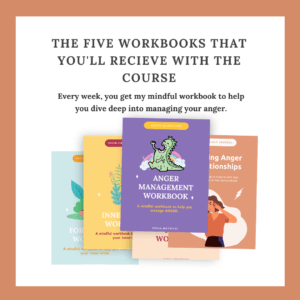
Relationships can be challenging at times but if you have the tools and resources to manage your emotions and heal your inner child, the problems can be solved.
For most of my clients, their anger behavior is a repeated pattern from their childhood trauma and this is why we have a separate module of inner-child healing inside my Anger Journaling course.
I recommend checking out this post on ‘Reparenting yourself’ if you wish to begin inner-child healing.
My Anger Journaling course comes with five intensive modules with include – video lessons, journals, and coaching sessions.
Here’re all the details about the course along with the testimonials.
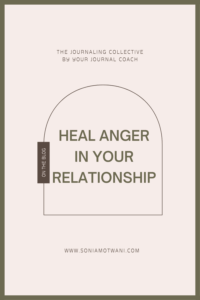
( pin this image to read later )


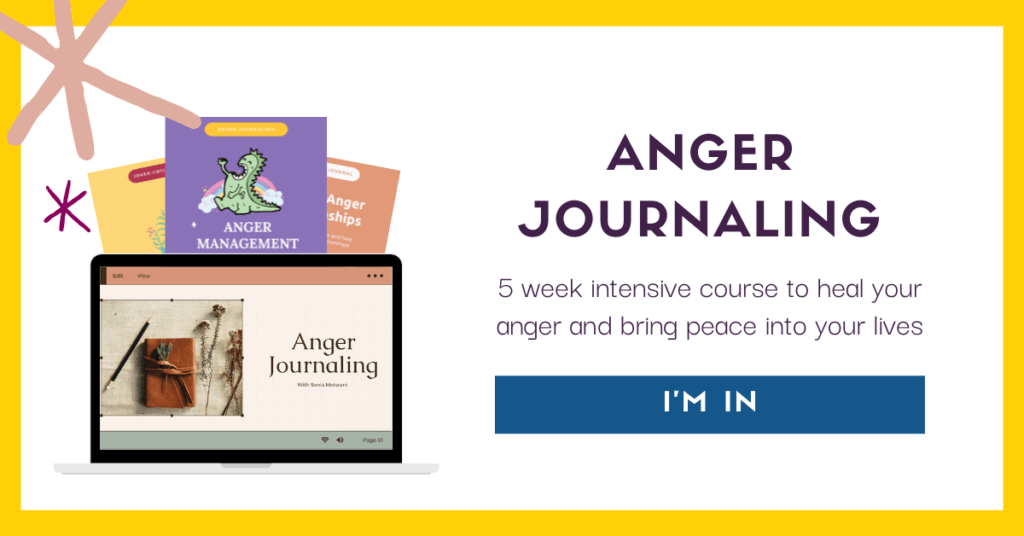
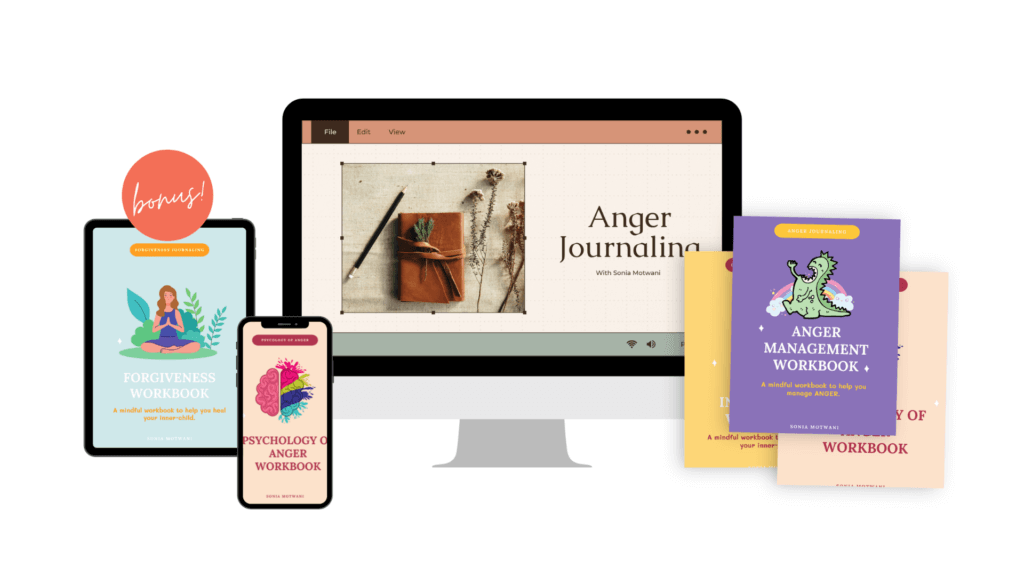
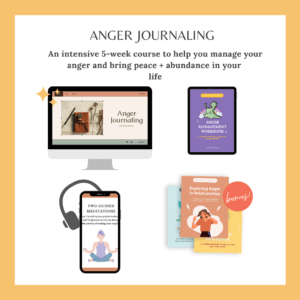
Leave a Reply